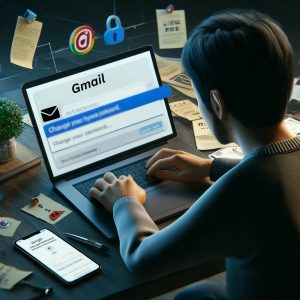Gmail Account Hacked
In the digital world, securing your email is as crucial as locking your front door. This is especially true when it comes to Gmail, one of the most widely used email services globally. A Gmail account hacked situation is not merely a breach of privacy; it can lead to significant losses, both personal and financial. The rise in instances where Gmail has been hacked signals a pressing need for heightened security measures.

When your Gmail got hacked, it exposes your personal data, financial details, and confidential communications to cybercriminals. This may lead to identity theft, money fraud, and a tarnished professional reputation. Understanding the serious repercussions of a Gmail hacked scenario is crucial for every user.
In this blog, we will go in detail about the signs that indicate your Gmail has been hacked, the immediate actions you should take to secure your account, and the preventative measures to keep it safe in the future. Our goal is to empower you with the knowledge to not only recover from such incidents but also to prevent them from happening in the first place. By the end of this blog, you’ll have a clear understanding of how to safeguard your Gmail account against unauthorized access and ensure its integrity.
Understanding How Gmail Accounts Get Hacked
Recognizing how a Gmail account got hacked is crucial for preventing future security breaches. Various techniques can compromise your email security, ranging from sophisticated phishing scams to malware attacks. In this section, we’ll explore the most common methods hackers use to hack in Gmail accounts.
-
Phishing Attack on Gmail Account:
Phishing is still among the most common tactics used by cybercriminals for a hack in Gmail accounts. In a phishing attempt, the attacker typically sends an email that seems to be from a trusted source, like Google itself, urging you to click on a link and urgently verify your account details. These emails often lead to fake login pages designed to steal your credentials. Once entered, your Gmail got hacked as the perpetrator now has access to your login information.

-
Malware and Spyware:
Malicious software, including malware and spyware, can infiltrate your system through unsafe email attachments, compromised websites, or untrusted downloads. Once installed, this software can log your keystrokes, thereby capturing your Gmail login details. Subsequently, this results in scenarios where your Gmail hacked password changed without your knowledge, providing attackers full access to your account.
-
Password Reuse and Brute Force Attacks:
Many users make the mistake of reusing passwords across multiple sites. If a hacker obtains a password from a less secure site, they can try the same password on more valuable accounts, including Gmail. Additionally, brute force attacks, where hackers use trial and error to guess your password, particularly if it is weak or commonly used, can lead to a hack in Gmail account.
-
Security Lapses on Connected Devices:
Often, a hack in Gmail account is not through direct attacks on Google but through vulnerabilities on other devices that are connected to your Gmail. This can include mobile devices, home assistants, or other smart devices that link to your Gmail for functionality. Weak security on these devices can provide a backdoor into your Gmail account.
-
Session Hijacking:
Session hijacking occurs when a hacker takes over a session between your computer and the Gmail server after you have successfully authenticated. This can happen if you access your email over an unsecured WiFi network, allowing a hacker to intercept the communication and gain control over your Gmail account.
-
Social Engineering:
This method involves manipulating people into revealing confidential information. Hackers might call or message you pretending to be from a reputable company (like Google) and trick you into providing them with your account details, leading to scenarios where your Gmail got hacked.
Understanding these hacking techniques underscores the importance of vigilance and proactive security measures. By being aware of how your Gmail account can be hacked, you can better protect yourself from potential threats and reinforce your defenses against future attacks. Remember, every security step you take significantly diminishes the chances of hack in Gmail account.
Recognizing the Signs of a Hack in Gmail Account
Identifying that your Gmail has been hacked is the first critical step in reclaiming and securing your digital life. Cyber intrusions can sometimes be subtle, and recognizing the early warning signs can help you to act swiftly to mitigate any damage. Here, we discuss several indicators that could suggest your Gmail account hacked status, helping you to recognize unauthorized access before it’s too late.

-
Unexpected Emails Sent or Received on Gmail Account:
One of the most apparent signs that your Gmail got hacked is finding emails in your Sent folder that you did not send or receiving replies to messages you never wrote. This often indicates that a hacker is using your account to send phishing emails or spread malware to your contacts.
-
Gmail Hacked Password Changed Notifications:
If you receive an email from Google stating that your password has been changed, and you did not initiate this change, it is a clear sign that your Gmail hacked password changed without your consent. Immediate action is required to recover your account and reset your security settings.
-
Unusual Account Activity Alerts from Google:
Google monitors for unusual activity, such as signing in from a new location or device. If you receive alerts about activities that you don’t recognize, this is a strong indication that your Gmail account hacked status is likely true, and someone else may have access to your account.
-
Changes in Gmail Account Settings:
Hackers often change account settings to maintain access or divert emails. Check for any alterations in your account settings that you did not make. This could include changes to recovery email addresses, forwarding settings, or filter/rules additions—all suggesting that your Gmail hacked status needs immediate attention.
-
Missing Emails in Gmail Account:
If emails begin to disappear from your inbox without any action on your part, it’s possible that someone with unauthorized access has deleted them. This can be part of an attempt to hide unauthorized activities associated with your account after your Gmail has been hacked.
-
Security Notifications from Other Accounts:
Since many users reuse passwords across multiple services, receiving security alerts from other online accounts can also be an indicator that your Gmail account hacked status has compromised more than just your email.
Immediate Steps to Take If Your Gmail got Hacked
When you discover that your Gmail account hacked, immediate action is vital to secure your account and limit any potential damage. Here are the essential steps you should follow to recover a hacked Gmail account and ensure your personal information remains protected.

-
Change Your Gmail Account Password:
As soon as you suspect your Gmail got hacked, the first step is to change your password. This is a critical measure to lock out the attacker. Create a strong, unique password that combines letters, numbers, and symbols. Avoid using easily guessed passwords or those that have been used on other sites.
-
Update Recovery Options of Gmail Account:
After changing your password, update your account recovery options. This includes your recovery email and phone number. Ensure these are up-to-date and secure, as they are essential for regaining access should you get locked out of your account or if your Gmail got hacked password changed.
-
Check Gmail Settings for Anomalies:
Examine your Gmail settings for any changes that you did not make, especially in forwarding, POP/IMAP, and filter settings. Hackers often alter these to intercept or hide emails, particularly after your Gmail account hacked. Reset any settings that have been tampered with to ensure no emails are redirected elsewhere.
-
Secure Your Connected Accounts with Gmail:
Given that your Gmail can be used to reset passwords on other services, it’s important to secure accounts on other platforms that use your Gmail for login or recovery. This step is essential to prevent a domino effect of account compromises stemming from your original Gmail hacked.
-
Perform a Security Checkup:
Google offers a helpful security checkup tool that can guide you through steps to secure your account. This tool helps in recovering a hacked Gmail account by showing you security issues and guiding you through fixing them.
-
Notify Your Contacts:
If your Gmail got hacked, there’s a chance that the hacker may have sent out phishing emails to your contacts. Notify your friends and colleagues about the breach so they can be on the lookout for suspicious emails that may have been sent from your account.
-
Report the Incident:
It’s helpful to report the hacking incident to Google. This can not only help to recover hacked Gmail account but also alert Google to potentially broader security issues affecting other users.
By taking these immediate steps after discovering that your Gmail account hacked, you can help mitigate the damage and secure your account from further unauthorized access. Remember, quick and decisive action is the key to recover hacked Gmail accounts and safeguard your digital presence.
Securing Your Gmail Account Post-Hack
After experiencing an incident where your Gmail got hacked, it’s essential to not only recover your account but to also enhance its security to prevent future attacks. Implementing robust security measures can significantly reduce the risk of having your Gmail account hacked again. Here’s a comprehensive guide to securing your Gmail following a breach.

-
Gmail Two-Factor Authentication (2FA):
One of the best ap to secure your Gmail account after it has been compromised is by enabling two-factor authentication. This adds another layer of security by requiring not only your password but also a second factor, generally a code sent to your phone, to gain access to your account. This makes it much harder for hackers to gain unauthorized access, despite having your password.
-
Use Strong, Unique Passwords for Gmail Account:
After recovering from a situation where your Gmail got hacked, ensure that you change your password to something strong and unique. Avoid common words and simple patterns, and instead use a mix of upper and lower case alphabets, numbers, and symbols. Consider using a password manager to generate and store complex passwords, making it less likely for your Gmail account to be hacked.
-
Regularly Update Recovery Options:
Make sure your account recovery options are always up-to-date. This includes your recovery email and phone number. Secure recovery options are crucial for regaining accessibility to your account if you ever forget your password or if your Gmail account got hacked.
-
Review Gmail Account Permissions:
Regularly check and manage which apps and services hcan access your Gmail account. Revoke any permissions that are no longer necessary or look suspicious. This prevents potentially malicious apps from having ongoing access to your Gmail, reducing the risk of future incidents where your Gmail has been hacked.
-
Secure Your Connected Devices with Gmail:
Ensure that all devices connected to your Gmail are secure. Update your operating systems, use security software, and apply all necessary patches and updates. Securing these devices plays a significant role in preventing situations where your Gmail got hacked due to vulnerabilities in connected devices.
-
Education on Phishing and Malware:
Educate yourself on the signs of phishing and the dangers of malware. Understanding how to recognize and avoid these threats can go a long way in protecting your account from being compromised again. Staying informed about security threats and how to handle them is key to avoiding another scenario where your Gmail got hacked.
-
Regular Gmail Security Audits:
Periodically perform security audits on your Gmail account. Use tools like Google’s Security Checkup to review and strengthen your account’s security settings. This can help you to catch any potential security issues before they lead to another instance of recovering a hacked Gmail account.
By applying these advanced security measures, you can enhance the resilience of your Gmail account against future attacks and ensure that your data remains protected.
Additional Security Tools to Prevent Hack in Gmail Account
After dealing with a Gmail account hacked incident, enhancing your email security with additional tools and resources is vital. These can help prevent future incidents and aid in the recovery process should your account be compromised again. Below, we explore various security tools and resources that can bolster your Gmail’s defenses.

-
Advanced Security Software:
Installing robust antivirus and anti-malware software is crucial to safeguard your devices from threats that could lead to hack in Gmail account. Look for software that gives real-time protection, regular updates, and phishing attack prevention. This software can serve as a first line of defense by detecting and removing threats before they can hack in Gmail accounts.
-
Virtual Private Networks (VPNs):
Using a VPN can greatly enhance your internet security, especially when accessing your Gmail from public or unsecured Wi-Fi networks. A VPN encrypts your internet connection, making it more difficult for cybercriminals to access your data and recover hacked Gmail
-
Two-Factor Authentication Apps:
While Gmail offers two-factor authentication, using a dedicated two-factor authentication app provides an additional layer of security. Apps like Google Authenticator or Authy generate time-sensitive codes on your device, which you need to log in. This makes it significantly more challenging for hackers to get unauthorized access even if they have your password.
-
Password Managers:
A password manager can generate and store complex passwords for your accounts, including Gmail. Using a different, strong password for each site you visit minimizes the risk of simultaneous compromises on multiple accounts, especially if your Gmail account hacked incident was due to a reused password.
-
Email Encryption Tools:
For enhanced privacy and security, consider using tools that encrypt your emails. Encryption tools like ProtonMail or Tutanota can be used alongside Gmail to ensure that your sensitive information remains confidential, reducing the impact of a Gmail account hacked.
-
Security Awareness Training:
Educational resources and courses can be invaluable in preventing Gmail account hacked Platforms like Cybrary or Infosec offer courses on best practices for cybersecurity and how to recognize phishing and other malicious activities.
-
Frequent Security Updates and Patches:
Keeping your software and devices updated is crucial. Regular updates often contain patches for security vulnerabilities that, if left unaddressed, could lead to a hack in Gmail account. Enable automatic updates to ensure you’re always protected.
-
Google’s Security Checkup Tool:
Google offers a Security Checkup tool that assesses your account’s security settings and recommends improvements to secure your account better. Regularly using this tool can help prevent situations where you need to recover hacked Gmail accounts by catching potential security issues early.
By incorporating these tools and resources into your cybersecurity strategy, you can significantly enhance your Gmail’s security posture. This proactive approach not only aids in recovering a hacked Gmail account but also fortifies it against future threats, ensuring your personal and professional communications remain safe and secure.
FAQs
Q. What are the immediate signs that my Gmail account has been hacked?
- A. Signs that your Gmail account has been hacked include unexpected emails sent from your account, changes in your account settings that you did not make, and alerts about a Gmail hacked password changed without your knowledge.
Q. What should I do if I suspect my Gmail account got hacked?
- A. If you suspect that your Gmail account got hacked, immediately change your password, update your recovery information, check for any unauthorized settings or app permissions, and conduct a security audit using Google’s Security Checkup tool.
Q. How can I recover a hacked Gmail account?
- A. To recover a hacked Gmail account, start by resetting your password to something strong and different. Then, review and secure your recovery options, check for suspicious activity, and remove any unfamiliar devices connected to your account. If you still do not get your account recovered, you can read our dedicated blog on Gmail Account Recovery and recover your account quickly.
Q. Can I prevent my Gmail from being hacked again?
- A. Yes, to prevent a hack in Gmail account again, enable two-factor authentication, use a robust and unique password, regularly update your security settings, and stay vigilant about phishing attempts.
Q. What are some common methods hackers use to access Gmail accounts?
- A. Hackers commonly use phishing scams, malware, password reuse across sites, and social engineering tactics to gain unauthorized access to Gmail accounts. Awareness and caution can significantly reduce the risk of hack in Gmail account.
Q. How do I know if someone hacked into my Gmail and what they accessed?
- A. Google provides a Security Checkup that includes a recent activity feature, showing you devices and locations where your account was accessed. This can help you determine if someone hacked into your Gmail and what they might have accessed.
Q. What steps should I take to secure my Gmail after recovering from a hack?
- A. After recovering a hacked Gmail account, secure it by changing your password, enabling two-factor authentication, reviewing connected apps and permissions, and using security tools like antivirus software and VPNs.
Q. Are there tools that can help protect my Gmail from future hacks?
- A. Yes, using advanced security tools like password managers, two-factor authentication apps, and up-to-date antivirus software can help to safeguard your Gmail account from being hacked.
Q. What should I do if I receive a notification that my Gmail account password has been changed but I didn’t initiate it?
- A. If you receive a notification about a Gmail hacked password changed but did not request it, immediately attempt to recover your account through Google’s account recovery process to regain control and prevent further unauthorized access.
Q. How do I handle situations where my Gmail got hacked and sensitive information was compromised?
- A. If your Gmail got hacked and sensitive information was compromised, report the breach to relevant authorities, notify contacts who may be affected, and consider additional security measures like credit monitoring if financial data was involved.
Conclusion
Dealing with a Gmail account hacked scenario can be daunting, yet it is an invaluable lesson in the importance of robust digital security. In this guide, we’ve highlighted several telltale signs that your Gmail has been hacked, such as unexpected emails, password alerts, and unauthorized changes to settings, urging immediate action to mitigate damage. It’s crucial to understand common hacking methods like phishing and malware, which can compromise your account, to strengthen your defenses effectively.
Upon realizing your Gmail account has been hacked, it’s essential to act swiftly by changing your password, updating recovery information, and auditing account permissions to secure your account and aid in recovering a hacked Gmail account. Post-recovery, implementing advanced security measures such as two-factor authentication and using strong, unique passwords is vital for enduring protection.
Moreover, embracing additional security resources and tools can greatly enhance your resilience against future attacks. Investing in quality antivirus software, employing email encryption for sensitive information, and staying informed through cybersecurity training are critical steps to safeguard your Gmail account. Regular security checkups and updates can further fortify your email against unauthorized access, ensuring that your Gmail account hacked experience is a one-time ordeal.
We urge all users to proactively manage their email security by staying alert to signs of potential breaches, regularly updating their security practices, and utilizing advanced protective tools. This not only helps in recovering a hacked Gmail account but also secures your broader digital footprint against emerging cyber threats. Your vigilance and proactive measures are your best defense against the challenges posed by Gmail account hacked incidents, ensuring that your digital life remains secure and private.
To know more about Gmail Account Hacked and other issue and solutions, you can visit our Gmail Support Page.


Michael williams
What immediate actions should I take if I notice unfamiliar activity and suspect that my Gmail got hacked?
Support Admin
If you notice unfamiliar activity and suspect that my Gmail got hacked, immediate and decisive action is essential to safeguard your information. Begin by changing your Gmail account password to a strong, unique combination that hasn’t been used before. Immediately after, update your recovery options, such as your phone number and recovery email, to secure means of account recovery. Examine your account settings for any unauthorized changes, particularly in the areas of email forwarding, filters, and connected apps, which are commonly exploited by hackers. Utilize Google’s Security Checkup tool to systematically review and enhance your account’s security settings, ensuring all vulnerabilities are addressed promptly.
Stephanie moore
What steps should I follow to restore my account and enhance its security if my Gmail account has been hacked and the password was altered?
Support Admin
If my Gmail account has been hacked and the password altered, restoring and securing your account involves several critical steps. Begin the recover hacked Gmail account process by visiting Google’s Account Recovery page to initiate a password reset. You will need to provide previous passwords and answer personal security questions accurately to prove your ownership of the account. Once you regain access, review and modify your recovery options to prevent future breaches. Implement two-factor authentication for an added layer of security, and thoroughly check for any settings or apps linked to your account that might give hackers further access. Conducting regular security audits using Google’s tools will help maintain the security integrity of your account going forward.